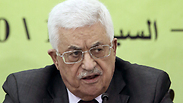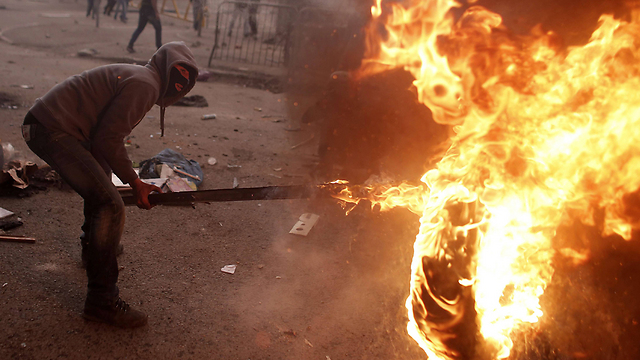
'Abbas is making it clear to Israel that where PA isn't present, Israel can't control the population
צילום: EPA
The battle over Jerusalem's sovereignty
Analysis: All the Palestinian factions, without exception, have created a combined front aimed at shaking off the Israeli control of Jerusalem. In order to stop PA's encouragement of violence, Israel can either resume peace talks or use more force.
Call it an intifada, call it a popular uprising, call it serious riots. The semantics won't change the fact that there is a bitter and violent battle taking place here over the sovereignty in Jerusalem.

All the Palestinian factions, without exception, have created a combined front aimed at shaking off the Israeli control of Jerusalem.
Every sector on this front has its own immediate interest. Hamas encourages violence in Jerusalem in order to maintain its status in the national struggle and cover up the paralysis it was struck with along the borders in Gaza.
The Palestinian Authority sees the violence in Jerusalem as a key political tool in the diplomatic intifada it is waging against Israel on the international front. Since Operation Protective Edge, Palestinian President Mahmoud Abbas has repeatedly announced that he will do everything in his power to present Palestine neither as an authority nor as an entity, but as a "state under occupation." The images of fire in the city of Jerusalem, which focus the world's attention, are classic images of occupation.
The Palestinians are also making more and more use of terminology taken from the Nazi occupation of the big cities of Europe in order to encourage the loathing towards Israel on the European street.
As the flames in Jerusalem rise higher, an increasing number of countries will gladly rush to unilaterally recognize the occupied Palestinian state. Sweden was the first one and all the rest are on their way – until the international mass is recruited to impose a diplomatic solution on Israel.

As the flames in Jerusalem rise higher, an increasing number of countries will gladly rush to unilaterally recognize the 'occupied Palestinian state' (Photo: AFP) (צילום: AFP)
Moreover, when Jerusalem is on fire, Abbas makes the following clear to Israel: In a place where we – the PA – are not present, you are incapable of controlling the population. If we're not in Jerusalem, you get embroiled in violence. The moment we decide to stop the coordination with your security organizations in the West Bank, you will get into trouble there as well.
But Israel continues to disregard him.
When Abbas announced several weeks ago that he plans to downgrade his ties with Israel to a minimum and hand Prime Minister Benjamin Netanyahu the keys, his intention wasn't to dismantle the PA, as Israeli officials interpreted and chuckled. What he meant was that the PA would no longer serve as a tool in Netanyahu's hands to control the West Bank's Arab residents.
He fulfilled this promise of his in Jerusalem. The PA is letting Israel rack its brains there. It's true that the Palestinians in Jerusalem are suffering and getting arrested, but as far as the PA is concerned, it's part of the struggle and it's worthwhile. It's not that the PA isn't intervening. On the contrary, it's inciting and fanning the flames.
In Israel, the political foolishness is disguised with a show of patriotism. Someone, for example, decided several days ago to close the Temple Mount. This fell into Abbas' hands like a ripe fruit: Why he would have paid for us to close the emotionally charged area, fight with the Jordanians, irritate Israel's Arabs and ignite the Islamic world.
And after all that, we still don't understand why the Jordanians recalled their ambassador to Israel. "How could they do this to us on the day an Israeli is murdered by a Palestinian in the heart of Jerusalem?" the Israeli citizen asks himself. "What happened to the Jordanians? Have they decided to encourage the murder of Israelis?"
The answer has nothing to do with the murder. No one told the public that only recently, Netanyahu promised Jordan's King Abdullah that he would work to quell the situation in Jerusalem. The king had every reason to believe that Netanyahu would do everything in his power to prevent provocations from the people under his control.
Only several hours had passed since he made the promise, and members of the prime minister's coalition already began making provocative statements about violating the status quo on the Temple Mount, and even went up there ostentatiously, which led to a flare-up and closure of the Al-Aqsa Mosque.
The Jordanians said the prime minister was not a man of his word, and that the Israelis only understood sanctions and force, and announced that they were recalling the ambassador, thereby supporting the instigation and incitement on the Palestinian side.
In order to calm the situation in Jerusalem, Israel must first and foremost make it not worthwhile for the Palestinian Authority to encourage the continuation of violence in Jerusalem. This can be achieved in two ways. The first is opening a door to renewed peace negotiations, and there is no chance of this happening in the current political constellation.
The second way is using more force, which Israel knows how to do very well: Roadblocks in Jerusalem, preventing Palestinians from crossing into Israel from the West Bank, harassment at the roadblocks, more arrests, searches, making economic decisions which will negatively affect the PA, imposing a closure on certain areas and bringing in more forces, more police and more Shin Bet officers in order to make the residents' life miserable. Why we are champions in using force.
In order to protect the pick-up stops and light rail stations, the operational sages decided within hours Wednesday to bring back the concrete blocks. This will surely be followed by the recommendations to create a separation – at a cost of tens of millions of shekels – between the road level and the train level, perhaps even place an armed steel rail in front of the stations to make it impossible for a vehicle to deviate and hit passengers.
These are more or less the solutions Israel knows how to create in these situations. And if they don't make this decision now – they will surely do it after the next terror attack.










